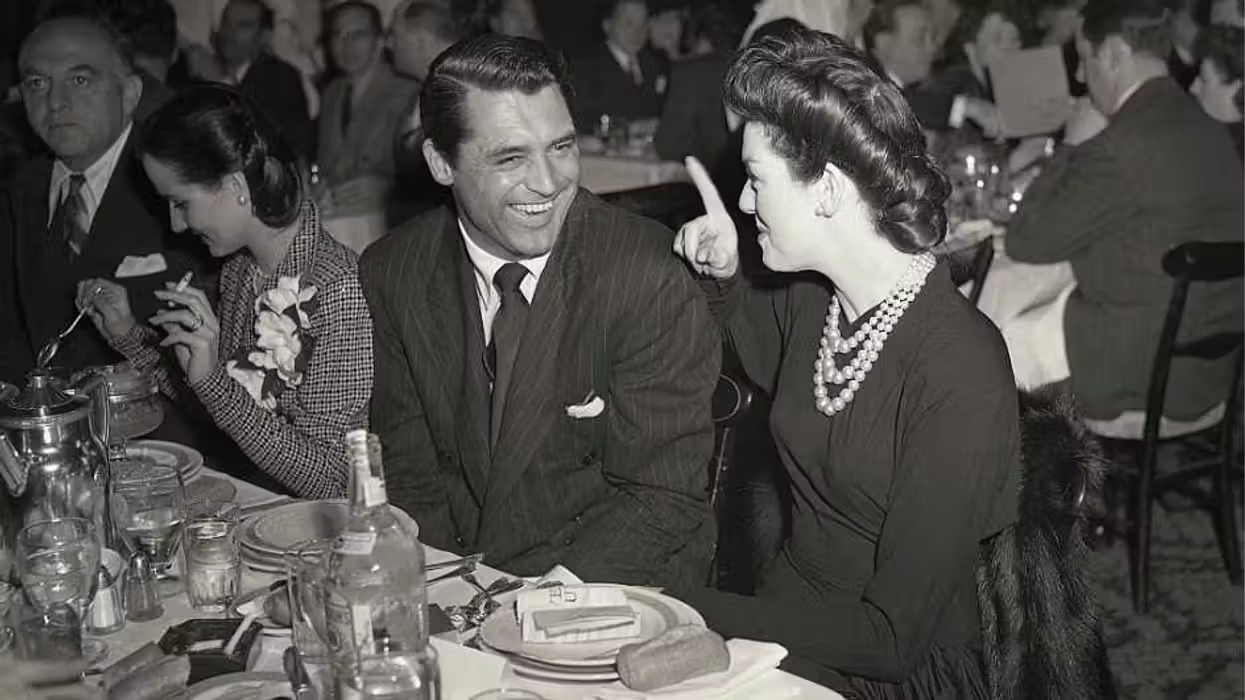
© 2026 Blaze Media LLC. All rights reserved.
Atheist Behind Infamous PA 'Slave' Billboard Speaks Out: 'It Is My Hate for the Bible
March 09, 2012
"The reason they're upset is just because they don't understand history."

Earlier this week, residents of Harrisburg, Pennsylvania, were sent into an uproar over an atheist billboard that presented the image of a shackled slave along with a Bible verse about the very same subject. While the sign has since been defaced and removed, the conversation -- and outrage -- over its creation and initial presence continues.
(Related: PA Atheists Use Race & Slave Imagery in Billboard Against the ‘Barbaric’ Christian Bible)
As The Blaze reported, the billboard was purchased and created by the PA chapter of American Atheists and Pa. Nonbelievers -- two groups that seek to promote non-belief in the state. The message aimed at railing against politicians who supported a resolution calling 2012 the "Year of the Bible," was posted just blocks away from the state capitol.
While the men behind the billboard have already come out to say that they believe the sign was misinterpreted, Ernest Perce V isn't done voicing his opinion on the matter. Perce, the state director of the American Atheist branch responsible for the billboard, is continuing to defend it (he made headlines in 2011 and 2012 after being attacked by a Muslim during a 2011 Halloween parade).
In an interview with CBS21, he doubled down, saying that the verse he chose was one of the more tamer of the Bible's slavery references.
"Exodus 20-21 says that if you beat your slave and he lives you will not be punished since he is your property," Perce said.

The verse he is referring to reads, "Anyone who beats their male or female slave with a rod must be punished if the slave dies as a direct result, but they are not to be punished if the slave recovers after a day or two, since the slave is their property." While controversial in some circles, Christian commentators claim that this was more of a sign of the cultural times than a Biblical mandate.
Historian David Barton has discussed the form of voluntary slavery that was allowed in Exodus, writing the following about the "sons of Israel":
Those who needed assistance, could not pay their debts, or needed protection from another were allowed under Biblical law to become indentured servants (see Ex. 21:2-6; Deut. 15:12-18). They were dependent on their master instead of the state. This was a way to aid the poor and give them an opportunity to get back on their feet. It was not to be a permanent subsidy. Many early settlers to America came as indentured servants. These servants were well treated and when released, given generous pay.
The complete verse that was paraphrased on the billboard reads, "Slaves, obey your earthly masters in everything; and do it, not only when their eye is on you and to curry their favor, but with sincerity of heart and reverence for the Lord."
Barton has addressed these words as well:
When Paul wrote how slaves and masters were to act (Eph. 6:5-9; Col. 4:1; 1 Tim. 6:1-2; Col. 3:22-25; Titus 2:9-10), he was not endorsing involuntary slavery or the Roman slave system. He was addressing the attitudes, actions, and matters of the heart of those Christians who found themselves in slavery or as slave owners. This encompassed many people, for half the population of Rome and a large proportion of the Roman Empire were slaves. Many people were converted to Christianity while slaves or slave owners, and many Christians were enslaved.
When it comes to the fallout from this latest billboard flap, Perce seems to be worried about his well-being.
"Stay alive, that is the first thing, constant security and I am really overwhelmed at how people misconceived a billboard, they misunderstood a billboard from an image that is American history," he told CBS21.
Despite this fear, he's not willing to back down.
"The reason they're upset is just because they don't understand history," he explained. "Reflecting back on history and showing how far we have come as a nation is not racism."
While this may, indeed, be true, the use of a Bible verse that wasn't properly placed in context teamed with an image that had nothing to do with the Biblical content itself may have led to some of the confusion and angst.
When asked if his actions constituted a hate crime, Perce had an intriguing response.
"It is a hate crime," he proclaimed. "It is my hate for the Bible and it is my disdain [for] the House of Representative who passed a Year of the Bible."
And those who found offense in the last billboard -- well, they may be in store for more. Making good on his previous promises, Perce says that there is more to come. Bus ads. New billboards. The works. In fact, he apparently says that the new ads may show Jews, as they were held as slaves during Biblical times.
Considering American Atheists' most recent drama with a Jewish community in Brooklyn, New York, one wonders how future billboards will pan out.
(H/T: WHPTV)
Want to leave a tip?
We answer to you. Help keep our content free of advertisers and big tech censorship by leaving a tip today.
Want to join the conversation?
Already a subscriber?
Billy Hallowell is a digital TV host and interviewer for Faithwire and CBN News and the co-host of CBN’s "Quick Start Podcast."
Billy Hallowell
Billy Hallowell is a digital TV host and interviewer for Faithwire and CBN News and the co-host of CBN’s "Quick Start Podcast."
more stories
Sign up for the Blaze newsletter
By signing up, you agree to our Privacy Policy and Terms of Use, and agree to receive content that may sometimes include advertisements. You may opt out at any time.
Related Content
© 2026 Blaze Media LLC. All rights reserved.
Get the stories that matter most delivered directly to your inbox.
By signing up, you agree to our Privacy Policy and Terms of Use, and agree to receive content that may sometimes include advertisements. You may opt out at any time.






